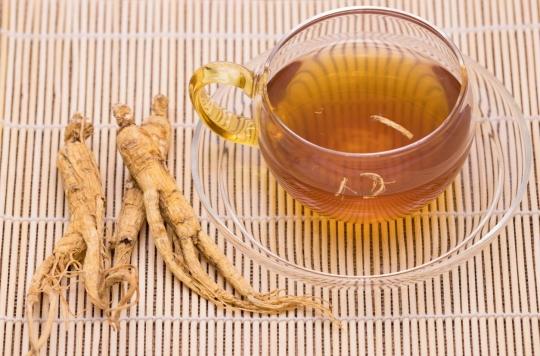
oriental carrot extract
It is available as a powder and in pill form. It is in cream and in coffee. And in Asia, where it comes from, they even put ginseng in toothpaste and cigarettes. What does that carrot actually do?
Ginseng, an ivy-like plant from Korea and China, has been attributed medicinal properties for over 1000 years. According to Asian tradition, that power lies in the fleshy root: eating it would make you vital and energetic.
The plant scientifically named Panax Ginseng is widely cultivated today for commercial purposes. The roots grow slowly and are only usable after three years. The longer you wait, the higher the concentration of active ingredients and the stronger the healing power. In Korea, a lot of money is paid for Panax Ginseng that is older than ten years.
Even in the supermarket
Today, Panax Ginseng and its variants are also grown in the West. The roots are then made into pills, drinks and even coffee. They are crazy about it in Asia: there is also ginseng in soap, cosmetics, toothpaste, drinks and even in cigarettes.
Now that the root is widely available, more and more beneficial properties are being attributed to it. Ginseng would not only be good for vitality, it would also improve the resistance give a boost, help against stress, reduce the risk of cancer and give strength to psychological problems. The root is even recommended in non-insulin dependent diabetes and in erection problems.
Nowadays you can find ginseng products in almost every health food store and also in many supermarkets. For those who want to run to the store right now: ho. The medicinal properties of ginseng have never been well researched.
Mapping side effects
The Food and Drug Administration, the US government agency that monitors the safety of food and drugs, has no reports on the effects and risks of ginseng in humans at this time. Recent research does confirm the stimulating effect in laboratory animals, which means that a slightly stimulating effect in humans (the effect that the Koreans originally described) cannot be ruled out.
It is certain that the current juggling with favorable effects is greatly exaggerated and only serves to increase popularity and therefore sales. In addition, if a product does have an effect, it also has side effects. This golden rule does not only apply to medicines, but also to food supplements and herbal remedies.
Some side effects of ginseng have now been mapped: the root extract interacts with enzyme systems, which means that chemotherapeutics, used to treat certain types of cancer, have been shown to be less effective.
Not during pregnancy
Some of the active ingredients from the ginseng root, the ginsenosides, have a structure that resembles the structure of the female hormone oestrogen. In pregnant rats, these substances cause abnormal embryos. This effect appears to be dose-dependent: the more ginseng, the more serious the abnormalities. Whether this also applies to pregnant women is not certain. Pending further clarity, the use of ginseng during pregnancy and breastfeeding is strongly discouraged. So if someone recommends ginseng to a pregnant woman as a remedy for morning sickness, immediately shout out loud: don’t do it.
Sources):
- Plus Magazine












